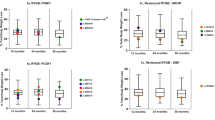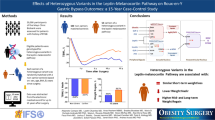Abstract
Introduction
Pathogenic heterozygous MC4R variants are associated with hyperphagia and variable degrees of obesity. Several research groups have reported short-term weight loss outcomes after bariatric surgery in a few patients with MC4R variants, but lack of longer-term data prevents evidence-based clinical decision-making.
Materials and Methods
Bariatric surgery patients with heterozygous (likely) pathogenic MC4R variants, from three collaborating centers in the Netherlands, France, and the UK, were compared to matched controls (matched 2:1 for age, sex, preoperative BMI, surgical procedure, and diabetes mellitus, but without MC4R mutations). Weight loss and regain outcomes up to 6 years of follow-up were compared.
Results
At 60 months of follow-up after RYGB, cases with MC4R variants showed weight regain with a mean of 12.8% (± 10.4 SD) total weight loss (TWL) from nadir, compared to 7.9% (± 10.5 SD) in the controls (p = 0.062). Among patients receiving SG, the cases with MC4R variants experienced inferior weight loss (22.6% TWL) during the first year of follow-up compared to the controls (29.9% TWL) (p = 0.010).
Conclusions
This multicenter study reveals inferior mid-term weight outcomes of cases with MC4R variants after SG, compared to RYGB. Since adequate weight loss outcomes were observed after RYGB, this procedure would appear to be an appropriate surgical approach for this group. However, the pattern of weight regain seen in cases with MC4R variants after both RYGB and SG highlights the need for pro-active lifelong management to prevent relapse, as well as careful expectation management.
Graphical abstract




Similar content being viewed by others
References
Dogan K, Betzel B, Homan J, et al. Long-term effect of laparoscopic Roux-en-Y gastric bypass on diabetes mellitus, hypertension and dyslipidaemia in morbidly obese patients. Obes Surg. 2014;24:1835–42. https://doi.org/10.1007/s11695-014-1310-2.
le Roux CW, Heneghan HM. Bariatric surgery for obesity. Med Clin N Am. 2018;108:165–82. https://doi.org/10.1016/j.mcna.2017.08.011.
Felsenreich DM, Langer FB, Kefurt R, et al. Weight loss, weight regain and conversions to Roux-en-Y gastric bypass: 10 year results of laparoscopic sleeve gastrectomy. Surg Obes Relat Dis. 2016;12(9):1655–62. https://doi.org/10.1016/j.soard.2016.02.021.
Lubrano-Berthelier C, Dubern B, Lacorte JM, et al. Melanocortin 4 receptor mutations in a large cohort of severely obese adults: prevalence, functional classification, genotype-phenotype relationship, and lack of association with binge eating. J Clin Endocrinol Metab. 2006;91(5):1811–8. https://doi.org/10.1210/jc.2005-1411.
Larsen LH, Echwald SM, Sorensen TI, Andersen T, Wulff BS, Pedersen O. Prevalence of mutations and functional analyses of melanocortin 4 receptor variants identified among 750 men with juvenile-onset obesity. J Clin Endocrinol Metab. 2005;90(1):219–24. https://doi.org/10.1210/jc.2004-0497.
Stutzmann F, Tan K, Vatin V, et al. Prevalence of melanocortin-4 receptor deficiency in Europeans and their age-dependent penetrance in multigenerational pedigrees. Diabetes. 2008;57(9):2511–8. https://doi.org/10.2337/db08-0153.
Vaisse C, Clement K, Durand E, Hercberg S, Guy-Grand B, Froguel P. Melanocortin-4 receptor mutations are a frequent and heterogeneous cause of morbid obesity. J Clin Investig. 2000;106(2):253–62. https://doi.org/10.1172/JCI9238.
Hatoum IJ, Stylopoulos N, Vanhoose AM, et al. Melanocortin-4 receptor signaling is required for weight loss after gastric bypass surgery. J Clin Endocrinol Metab. 2012;97(6):E1023–31. https://doi.org/10.1210/jc.2011-3432.
Farooqi IS, Keogh JM, Yeo GS, Lank EJ, Cheetham T, O’Rahilly S. Clinical spectrum of obesity and mutations in the melanocortin-4-receptor gene. N Engl J Med. 2003;348:1085–95. https://doi.org/10.1056/NEJMoa022050.
Demiralp DO, Berberoglu M, Akar N. Melanocortin-4 receptor polymorphisms in Turkish pediatric obese patients. Clinical and applied thrombosis/hemostasis : official journal of the International Academy of Clinical and Applied Thrombosis/Hemostasis. 2011;17(1):70–4. https://doi.org/10.1177/1076029609354330.
van den Berg L, van Beekum O, Heutink P, et al. Melanocortin-4 receptor gene mutations in a Dutch cohort of obese children. Obesity. 2011;19(3):604–11. https://doi.org/10.1038/oby.2010.259.
Hainerova I, Larsen LH, Holst B, et al. Melanocortin 4 receptor mutations in obese Czech children: studies of prevalence, phenotype development, weight reduction response, and functional analysis. J Clin Endocrinol Metab. 2007;92(9):3689–96. https://doi.org/10.1210/jc.2007-0352.
Aslan YR, Ranadive SA, Ersoy BA, Rogers SJ, Lustig RH, Vaisse C. Bariatric surgery outcome in a patient with complete MC4R deficiency. Int J Obes. 2011;35(3):457–61. https://doi.org/10.1038/ijo.2010.168.
Jelin EB, Daggag H, Speer AL, et al. Melanocortin-4 receptor signaling is not required for short-term weight loss after sleeve gastrectomy in pediatric patients. Int J Obes. 2016;40:550–3. https://doi.org/10.1038/ijo.2015.230.
Censani M, Conroy R, Deng L, et al. Weight loss after bariatric surgery in morbidly obese adolescents with MC4R mutations. Obesity. 2014;22(1):225–31. https://doi.org/10.1002/oby.20511.
Valette M, Poitou C, Le Beyec J, Bouillot JL, Clement K, Czernichow S. Melanocortin-4 receptor mutations and polymorphisms do not affect weight loss after bariatric surgery. PLoS ONE. 2012;7(11): e48221. https://doi.org/10.1371/journal.pone.0048221.
Moore BS, Mirshahi UL, Yost EA, et al. Long-term weight-loss in gastric bypass patients carrying melanocortin 4 receptor variants. PLoS ONE. 2014;9(4): e93629. https://doi.org/10.1371/journal.pone.0093629.
Elkhenini HF, New JP, Syed AA. Five-year outcome of bariatric surgery in a patient with melanocortin-4 receptor mutation. Clinical Obesity. 2014;4:121–4. https://doi.org/10.1111/cob.12051.
Aslan YR, Campos GM, Calton MA, Evans DS, Merriman RB, Vaisse C. Weight loss after Roux-en-Y gastric bypass in obese patients heterozygous for MC4R mutations. Obes Surg. 2011;21:930–4. https://doi.org/10.1007/s11695-010-0295-8.
Cooiman MI, Kleinendorst L, Aarts EO, et al. Genetic obesity and bariatric surgery outcome in 1014 patients with morbid obesity. Obes Surg. 2019.https://doi.org/10.1007/s11695-019-04184-w
Li Y, Zhang H, Tu Y, et al. Monogenic obesity mutations lead to less weight loss after bariatric surgery: a 6-year follow-up study. Obes Surg. 2019;29(4):1169–73. https://doi.org/10.1007/s11695-018-03623-4.
Kleinendorst L, Massink MPG, Cooiman MI, et al. Genetic obesity: next-generation sequencing results of 1230 patients with obesity. J Med Genet. 2018;(0):1-9.https://doi.org/10.1136/jmedgenet-2018-105351
Richards S, Aziz N, Bale S, Bick D, Das S, Gastier-Foster J. Standards and guidelines for the interpretation of sequence variants: a joint consensus recommendation of the American College of Medical Genetics and Genomics and the Association of molecular pathology. Genet Med. 2015;17(5):405–24. https://doi.org/10.1038/gim.2015.30.
Brethauer SA, Kim J, el Chaar M, et al. Standardized outcomes reporting in metabolic and bariatric surgery. Surg Obes Relat Dis. 2015;11(3):489–506. https://doi.org/10.1016/j.soard.2015.02.003.
van de Laar AW, van Rijswijk AS, Kakar H, Bruin SC. Sensitivity and specificity of 50% excess weight loss (50% EWL) and twelve other bariatric criteria for weight loss success. Obes Surg. 2018. https://doi.org/10.1007/s11695-018-3173-4.
Shoar S, Saber A. Long-term and midterm outcomes of laparoscopic sleeve gastrectomy versus Roux-en-Y gastric bypass: a systematic review and meta-analysis of comparative studies. Surg Obes Relat Dis. 2016; 00–00. Doi: https://doi.org/10.1016/j.soard.2016.08.011
Karmali S, Brar B, Shi X, Sharma AM, de Gara C, Birch DW. Weight recidivism post-bariatric surgery: a systematic review. Obes Surg. 2013;23(11):1922–33. https://doi.org/10.1007/s11695-013-1070-4.
Shantavasinkul PC, Omotosho P, Corsino L, Portenier D, Torquati A. Predictors of weight regain in patients who underwent Roux-en-Y gastric bypass surgery. Surg Obes Relat Dis. 2016;12(9):1640–5. https://doi.org/10.1016/j.soard.2016.08.028.
Voorwinde V, Steenhuis IHM, Janssen IMC, Monpellier VM, Stralen van MM. Definitions of long-term weight regain and their associations with clinical outcome. Obes Surg. 2020;30:527–36. https://doi.org/10.1007/s11695-019-04210-x.
Homan J, Boerboom A, Aarts E, et al. A longer biliopancreatic limb in Roux-en Y gastric bypass improves weight loss in the first years after surgery: results of a randomized controlled trial. Obes Surg. 2018. https://doi.org/10.1007/s11695-018-342.
Thereaux J, Corigliano N, Poitou C, Oppert J-M, Czernichow S, Bouillot J-L. Comparison of results after one year between sleeve gastrectomy and gastric bypass in patients with BMI≥50 kg/m2. Surgery for Obesity and Related Diseases. 2015;11(4):785–90. https://doi.org/10.1016/j.soard.2014.11.022.
Thereaux J, Veyrie N, Bardsmisn C, et al. Similar postoperative safety between primary and revisional gastric bypass for failed gastric banding. JAMA Surg. 2014;149(8):780–6. https://doi.org/10.1001/jamasurg.2014.625.
Dijkhorst PJ, Boerboom AB, Janssen IMC, et al. Failed sleeve gastrectomy: single anastomosis duodenoileal bypass or Roux-en-Y gastric bypass? A multicentre cohort study Obes Surg. 2018. https://doi.org/10.1007/s116965-018-3429-z.
Miras AD, Kamocka A, Tan T, et al. Long limb compared with standard limb Roux-en-Y gastric bypass for type 2 diabetes and obesity: the LONG LIMB RCT. Efficacy Mech Eval 2021;8(3). Doi: https://doi.org/10.3310/eme08030
Saleh M, Cheruvu MS, Moorthy K, Ahmed AR. Laparoscopic sleeve gastrectomy using a synthetic bioabsorbable staple line reinforcement material: post-operative complications and 6 year outcomes. Ann Med Surg. 2016;10:83–7. https://doi.org/10.1016/j.amsu.2016.08.005.
Aarts EO, Dogan K, Koehestanie P, Aufenacker ThJ, Janssen IMC, Berends FJ. Long-term results after laparoscopic adjustable gastric banding: a mean fourteen year follow-up study. Surgery for Obesity and Related Diseases. 2014. https://doi.org/10.1016/j.soard.2014.03.019.
Allen RE, Hughes TD, Ng JL, et al. Mechanisms behind the immediate effects of Roux-en-Y gastric bypass surgery on type 2 diabetes. Theor Biol Med Model. 2013;10:45. https://doi.org/10.1186/1742-4682-10-45.
Pucci A, Batterham RL. Mechanisms underlying the weight loss effects of RYGB and SG: similar, yet different. J Endocrinol Invest. 2019;42:117–28. https://doi.org/10.1007/s40618-018-0892-2.
Wadden TA, Tronieri JS, Sugimoto D, et al. Liraglutide 3.0 mg and intensive behavioral therapy (BIT) for obesity in primary care: the SCALE IBT randomized controlled trial. Obesity 2020;28(3):529–536. Doi: https://doi.org/10.1002/oby.22726.
Collet TH, Dubern B, Mokrosinski J, et al. Evaluation of a melanocortin-4 receptor (MC4R) agonist (setmelanotide) in MC4R deficiency. Mol Metab. 2017;6(10):1321–9. https://doi.org/10.1016/j.molmet.2017.06.015.
Clement K, van den Akker E, Argente J, et al. Efficacy and safety of setmelanotide, an MC4R agonist, in individuals with severe obesity due to LEPR or POMC deficiency: single-arm, open-label, multicentre, phase 3 trial. Lancet Diabetes&Endocrinology. 2020. https://doi.org/10.1016/S2213-8587(20)30364-8.
Acknowledgements
We would like to special thank S.M. Oussaada, MD, for her help in the conceptualization of this manuscript.
Author information
Authors and Affiliations
Corresponding authors
Ethics declarations
Ethical Approval
All procedures performed in this study were in accordance with the ethical standards of the institutional and/or national research committee and with the 1964 Helsinki declaration and its later amendments or comparable ethical standards.
Informed Consent
Informed consent was obtained from all individual participants included in the study.
Conflict of Interest
The authors declare no competing interests.
Additional information
Publisher's Note
Springer Nature remains neutral with regard to jurisdictional claims in published maps and institutional affiliations.
Key points
• Inferior weight loss was identified after SG in patients with MC4R variants.
• RYGB appears to be an appropriate surgical approach for patients with MC4R variants.
• Patients with an MC4R variant showed weight regain after both surgical procedures.
• Pro-active lifelong management to prevent relapse is important.
Supplementary Information
Below is the link to the electronic supplementary material.
Rights and permissions
About this article
Cite this article
Cooiman, M.I., Alsters, S.I.M., Duquesnoy, M. et al. Long-Term Weight Outcome After Bariatric Surgery in Patients with Melanocortin-4 Receptor Gene Variants: a Case–Control Study of 105 Patients. OBES SURG 32, 837–844 (2022). https://doi.org/10.1007/s11695-021-05869-x
Received:
Revised:
Accepted:
Published:
Issue Date:
DOI: https://doi.org/10.1007/s11695-021-05869-x




